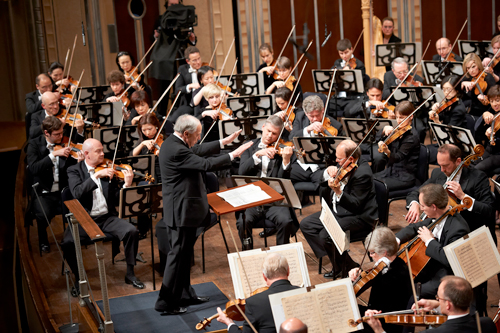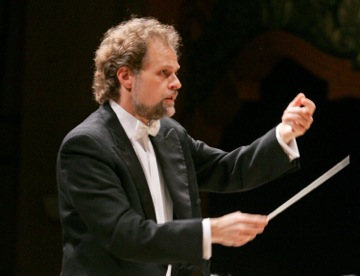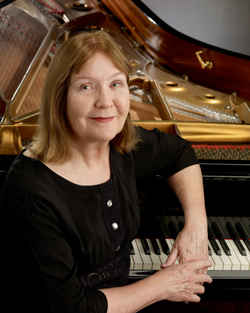by Mike Telin

On Wednesday, October 5 at 8:00 pm in Kulas Hall at the Cleveland Institute of Music, Steven Smith will lead the CIM Orchestra in a program titled “Boulez the Conductor” as part of CIM’s series celebrating “The Boulez Legacy.” The evening will feature Stravinsky’s Le Chant du Rossignol, Mahler’s “Adagio” from Symphony No. 10, and Messiaen’s Sept Haïkaï: Esquisses japonaises with Cleveland Orchestra principal keyboard and CIM faculty member Joela Jones as soloist.
Steven Smith had the opportunity to work with Pierre Boulez from 1997 to 2003 when Smith served as Assistant Conductor of The Cleveland Orchestra. “He was always the perfect gentleman — very collegial and supportive,” Smith said by telephone from Richmond, Virginia, where he is music director of the Richmond Symphony. “I feel extraordinarily fortunate not only to have been able to observe him at work during the rehearsal process — which was fascinating — but also to have gotten to know him personally.”

Given all of the programming options that would have fit the theme of this concert, how did Smith come to choose the Stravinsky, Mahler, and Messiaen? “The possibilities were almost endless. We did toy with programming some of his own orchestral works but we wanted to approach this program as him as the conductor, which really became the guiding principle. We wanted to have a nicely balanced program, one that was going to be good from an educational standpoint for the student orchestra, but also to select composers with whom Boulez had a special affinity or connection.”
Smith gave his insights into Boulez’s rehearsal process. “I began to understand the often-spoken criticism of him as a conductor — that he was just very matter-of-fact and showed no emotion. And you can understand why people would say that because he was very unassuming on the podium. But it wasn’t about him, it was all about the music, and he in no way wanted to be a distraction. I figured out pretty quickly that those relatively minimal gestures embodied his thorough knowledge of the score, and every one of those gestures meant something to every single person in the orchestra. So this idea that he was just cold and analytical is actually kind of silly because he allowed the music to breathe and speak. The composer’s emotions flowed through him, and we experienced that.”

“Pierre-Laurent Aimard was scheduled to play and record Réveil des oiseaux and Sept haïkaï,” Jones recalled during a recent telephone conversation. “But I got a call from the orchestra management the Thursday before the first performance. There had been a misunderstanding and Aimard didn’t realize he was supposed to play both pieces. Although he had played Sept haïkaï, he had no time to review it. So they asked me if I knew it — I said no. Then they asked me if I could learn it in time — I said that I would try.”
Jones remembers getting the music that evening, and as luck would have it, the Orchestra had been given the weekend off because of Presidents’ Day. “My husband Richard and I were planning to go skiing with our son, so they went without me and I stayed home and practiced about ten hours a day. I remember at the first rehearsal on Tuesday morning, I told Mr. Boulez that I had just gotten the music and started learning it on Friday. He said, ‘Don’t worry Joela, it will be fine.’ With his calmness and his beautiful conducting — simple, direct, and clear as a bell — the performances actually went very well, and we recorded it the following Monday. I remember how kind and wonderful he was to me at that first rehearsal. He’s a very calm person, and just being around him makes you relaxed. He made everything comfortable for me. It was a wonderful opportunity and I really appreciated it very much.”
Although Jones has performed Messiaen’s work since that time, she said that it takes time to relearn. “Every time I go back to it, it’s like I have never seen it before. There are so many notes, and a fist full of accidentals in the right and left hands.”
Messiaen, a passionate ornithologist, composed Sept haïkaï after he had visited Japan. “He was so impressed with Japan,” said Jones. “In the work’s central movement, Gagaku [named for the Japanese court orchestra], you hear gongs, chimes, and a gamelan. He replicates the sound of the hichiriki by combining the oboe with the trumpet and horn. The eight violins are imitating the shō, a Japanese mouth organ. It’s one of my favorite movements, but perhaps that’s because I don’t play during it,” she said with a laugh.
Jones feels extremely fortunate to have been able to learn so much complicated repertoire under the tutelage of Pierre Boulez. She recounted his famous sectional rehearsals. “He’d spend two hours with the strings, two hours with the woodwinds and brass, and another two with the percussion, keyboards, and harps — all in one day. With big complex pieces you sometimes hope you can hide, but you can’t do that in sectionals. Of course it was always difficult to hide from Pierre because he heard everything. He rehearsed this way not just with Messiaen, but also with the music of Carter, Schoenberg, Webern, and Berg.”
Jones said she will always remember Boulez’s patience. “Pierre would rehearse a piece until we got it right, but he would remain totally calm, and never got agitated if it took some of us eight or ten times to play it correctly. He would stop and say, ‘No, no, no,’ and often solfège the part in his beautiful French, then we’d do it again. It was amazing.”
Published on ClevelandClassical.com October 3, 2016.
Click here for a printable copy of this article


